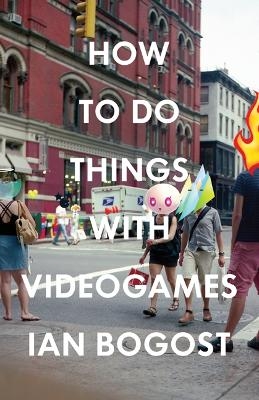
How to Do Things with Videogames
Seiten
2011
University of Minnesota Press (Verlag)
978-0-8166-7647-7 (ISBN)
University of Minnesota Press (Verlag)
978-0-8166-7647-7 (ISBN)
A fresh look at computer games as a mature mass medium with unlimited potential for cultural transformation
In recent years, computer games have moved from the margins of popular culture to its center. Reviews of new games and profiles of game designers now regularly appear in the New York Times and the New Yorker, and sales figures for games are reported alongside those of books, music, and movies. They are increasingly used for purposes other than entertainment, yet debates about videogames still fork along one of two paths: accusations of debasement through violence and isolation or defensive paeans to their potential as serious cultural works. In How to Do Things with Videogames, Ian Bogost contends that such generalizations obscure the limitless possibilities offered by the medium’s ability to create complex simulated realities.
Bogost, a leading scholar of videogames and an award-winning game designer, explores the many ways computer games are used today: documenting important historical and cultural events; educating both children and adults; promoting commercial products; and serving as platforms for art, pornography, exercise, relaxation, pranks, and politics. Examining these applications in a series of short, inviting, and provocative essays, he argues that together they make the medium broader, richer, and more relevant to a wider audience.
Bogost concludes that as videogames become ever more enmeshed with contemporary life, the idea of gamers as social identities will become obsolete, giving rise to gaming by the masses. But until games are understood to have valid applications across the cultural spectrum, their true potential will remain unrealized. How to Do Things with Videogames offers a fresh starting point to more fully consider games’ progress today and promise for the future.
In recent years, computer games have moved from the margins of popular culture to its center. Reviews of new games and profiles of game designers now regularly appear in the New York Times and the New Yorker, and sales figures for games are reported alongside those of books, music, and movies. They are increasingly used for purposes other than entertainment, yet debates about videogames still fork along one of two paths: accusations of debasement through violence and isolation or defensive paeans to their potential as serious cultural works. In How to Do Things with Videogames, Ian Bogost contends that such generalizations obscure the limitless possibilities offered by the medium’s ability to create complex simulated realities.
Bogost, a leading scholar of videogames and an award-winning game designer, explores the many ways computer games are used today: documenting important historical and cultural events; educating both children and adults; promoting commercial products; and serving as platforms for art, pornography, exercise, relaxation, pranks, and politics. Examining these applications in a series of short, inviting, and provocative essays, he argues that together they make the medium broader, richer, and more relevant to a wider audience.
Bogost concludes that as videogames become ever more enmeshed with contemporary life, the idea of gamers as social identities will become obsolete, giving rise to gaming by the masses. But until games are understood to have valid applications across the cultural spectrum, their true potential will remain unrealized. How to Do Things with Videogames offers a fresh starting point to more fully consider games’ progress today and promise for the future.
Ian Bogost is professor of digital media at the Georgia Institute of Technology. His books include Persuasive Games: The Expressive Power of Videogames and Newsgames: Journalism at Play.
Contents
Introduction: Media Microecology
1. Art
2. Empathy
3. Reverence
4. Music
5. Pranks
6. Transit
7. Branding
8. Electioneering
9. Promotion
10. Snapshots
11. Texture
12. Kitsch
13. Relaxation
14. Throwaways
15. Titillation
16. Exercise
17. Work
18. Habituation
19. Disinterest
20. Drill
Conclusion: The End of Gamers
Notes
Gameography
| Reihe/Serie | Electronic Mediations |
|---|---|
| Verlagsort | Minnesota |
| Sprache | englisch |
| Maße | 140 x 216 mm |
| Themenwelt | Sachbuch/Ratgeber ► Freizeit / Hobby |
| Informatik ► Weitere Themen ► Computerspiele | |
| Sozialwissenschaften ► Kommunikation / Medien ► Medienwissenschaft | |
| ISBN-10 | 0-8166-7647-X / 081667647X |
| ISBN-13 | 978-0-8166-7647-7 / 9780816676477 |
| Zustand | Neuware |
| Haben Sie eine Frage zum Produkt? |
Mehr entdecken
aus dem Bereich
aus dem Bereich
Ein offizielles Minecraft-Handbuch
Buch | Hardcover (2022)
SchneiderBuch (Verlag)
CHF 19,90
Ein offizielles Minecraft-Handbuch
Buch | Hardcover (2022)
SchneiderBuch (Verlag)
CHF 19,90
Über 20 exklusive Bauanleitungen
Buch | Hardcover (2023)
SchneiderBuch (Verlag)
CHF 18,90


